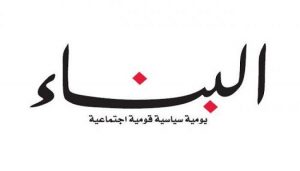Biden and Netanyahu Consult on Response to Iran, While Iran Warns of a Harsher Retaliation / Afif from Dahiya: Sayyed’s Promise Is That We Will Rebuild It More Beautifully, and the Resistance Is in Excellent Shape
The Resistance Writes Its First Ground Battle Epic: 100 Casualties in the Egoz Unit

October 03, 2024
The political editor wrote
As a high-level meeting took place at Speaker Nabih Berri’s office, including Prime Minister Najib Mikati and former leader of the Progressive Socialist Party Walid Jumblatt, its aim was to address both the internal Lebanese audience and the wider Arab and international community. The meeting sought to launch a political initiative to strengthen internal unity in the face of the open war on Lebanon, and to create a national atmosphere that would tackle the displacement crisis from Dahiya, the south, and the Bekaa to various parts of Lebanon. It also aimed to secure Arab and international support for Lebanon, both in terms of relief and political backing, by reaffirming Lebanon’s commitment to Resolution 1701, based on the American-French initiative endorsed by several Western and Arab leaders.
Meanwhile, Israeli airstrikes continued relentlessly on Dahiya, the south, and the Bekaa, claiming more lives, injuring many, and causing widespread destruction. These raids displaced even more residents, while the resistance fiercely repelled ground advances by the Occupation’s units and fired rockets deep into northern occupied Palestine.
On the international and regional stage, consultations between U.S. President Joe Biden and the occupying entity’s Prime Minister Benjamin Netanyahu centered on the nature of Israel’s response to the Iranian strike. The occupation army had admitted the day before that the strike had inflicted damage on several of its military installations and airbases. While Biden called for a measured response, preempting Israeli discussions of possibly targeting Iranian nuclear facilities, American media reported that Israeli officials denied any intent to strike these sites, agreeing to remain within a response threshold that would secure U.S. support. Meanwhile, Iran, through its president and other high-ranking officials, warned that any Israeli retaliation targeting its military or civilian infrastructure would be met with a far harsher Iranian response.
On the southern border, the resistance waged the first epic battles it had long awaited, aiming to restore the balance of power that the occupation army had monopolized with airstrikes and assassinations, culminating in the killing of Hezbollah Secretary-General Sayyed Hassan Nasrallah. The resistance lived up to the hopes and expectations of its supporters. By yesterday morning, it had been revealed that a specialized ambush in the outskirts of Adaisseh and Maroun Al-Ras had inflicted nearly 100 casualties—dead and wounded—on the elite Israeli Egoz unit, renowned for its guerrilla warfare expertise and part of the Golani Brigade’s finest forces. The unit had attempted to infiltrate the two towns, only to fall into the resistance’s trap, where it was showered with gunfire, mortars, and rockets. Support forces trying to rescue them were also targeted, with helicopters seen evacuating the dead and wounded. The occupation army admitted to eight fatalities, including five officers, and an equal number of injuries. By last night, further reports emerged of renewed attempts at ground advances, with the resistance engaging in fierce clashes along the border from Yaroun, near Bint Jbeil, to the city of Khiam.
In Dahiya, Hezbollah organized a media tour led by its media relations officer, Mohammad Afif. He briefed journalists on the ongoing border clashes in the south and the systematic destruction the occupation army was inflicting on Dahiya. Afif reassured everyone that the resistance was in excellent shape and reiterated Sayyed Nasrallah’s promise to rebuild Dahiya even more beautifully.




